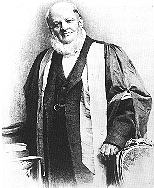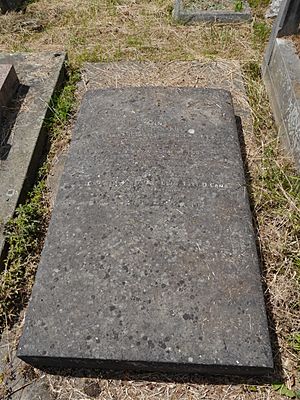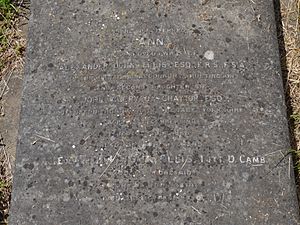Alexander John Ellis facts for kids
Quick facts for kids
Alexander John Ellis
FRS
|
|
|---|---|
 |
|
| Born |
Alexander Sharpe
14 June 1814 Hoxton, Middlesex, England
|
| Died | 28 October 1890 (aged 76) Kensington, London, England
|
| Education | Shrewsbury School, Eton College |
| Alma mater | Trinity College, Cambridge |
| Occupation | mathematician and philologist |
Alexander John Ellis (born 14 June 1814 – died 28 October 1890) was an English mathematician and philologist. A philologist studies languages, especially their history. He was also an early phonetician, someone who studies the sounds of human speech. His work also influenced musicology, which is the study of music.
In 1825, Alexander changed his last name from Sharpe (his father's name) to Ellis. This was a condition for him to receive important financial help from a relative on his mother's side. He is buried in Kensal Green Cemetery in London.
About Alexander John Ellis
Alexander John Sharpe was born in Hoxton, Middlesex, England. His family was quite wealthy. His father, James Birch Sharpe, was a well-known artist and doctor. His mother, Ann Ellis, came from a noble family.
Alexander went to Shrewsbury School and Eton College. He then studied at Trinity College, Cambridge. He first trained in mathematics and classic subjects. Later, he became a famous phonetician. He even wrote the article about phonetics for the Encyclopaedia Britannica in 1887.
His work in phonetics led him to study vocal pitch. This is how high or low a sound is. From there, he became interested in musical pitch. He also studied how people speak and sing.
Ellis is known for translating a book called On the Sensations of Tone. This book was written by Hermann von Helmholtz. Ellis added many notes to his translation. The second edition of his translation, published in 1885, included his own ideas on these topics.
In his writings about musical pitch, Ellis created a system called "cents." This system helps measure musical intervals, which are the distances between notes. This idea became very important in comparative musicology. This field compares music from different cultures. It is now called ethnomusicology.
Ellis studied the musical scales of many European traditions. He showed that the different ways music is organized cannot be explained by just one simple rule. Earlier scholars had thought there was only one rule.
In one part of his series On Early English Pronunciation, he found 42 different dialects in England and Scotland. A dialect is a way of speaking a language that is specific to a region. This was one of the first times phonetics was used to study English speech. Linguists still refer to his work today.
The famous writer George Bernard Shaw said that Alexander Ellis was the inspiration for Professor Henry Higgins. This character is from Shaw's play Pygmalion. This play was later made into the musical My Fair Lady.
In June 1864, Ellis was chosen as a Fellow of the Royal Society. This is a very important group for scientists.
Alexander's son, Tristram James Ellis, first trained as an engineer. But he later became a well-known painter. He was especially known for his paintings of the Middle East.
Phonetic Alphabets
Ellis created two phonetic alphabets. A phonetic alphabet uses symbols to show how words are pronounced.
One was the English Phonotypic Alphabet. He made this with Isaac Pitman. It used many new letters. The other was the Palaeotype alphabet. This alphabet used letters that were turned around, like ⟨ə⟩ and ⟨ɔ⟩. It also used small capital letters, like ⟨ɪ⟩, and italics.
Two of his new letters are still used today. These are ⟨ʃ⟩ and ⟨ʒ⟩. They were passed on to Henry Sweet's Romic alphabet. From there, they became part of the International Phonetic Alphabet (IPA). The IPA is used worldwide to write down speech sounds.
Works (selected)
- 1845, The Alphabet of Nature
- 1848, A Plea for Phonetic Spelling: or, The Necessity of Orthographic Reform
- 1869, On Early English Pronunciation, London: N. Trübner / reissued by Greenwood Press: New York (1968).
- --do.-- On early English pronunciation : with especial reference to Shakspere and Chaucer, containing an investigation of the correspondence of writing with speech in England from the Anglosaxon period to the present day ... (text online at "archive.org")
- 1885, "On the Musical Scales of Various Nations", Journal of the Society of Arts 33, p. 485. (Link is to a HTML transcription (Accessed September 2008)
- 1890, English Dialects – Their Sounds and Homes
 | Delilah Pierce |
 | Gordon Parks |
 | Augusta Savage |
 | Charles Ethan Porter |



